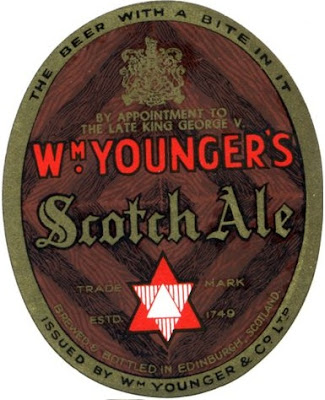Top of the Shilling Ale tree was 160/-, at an impressive 1115º. Not that they brewed huge amounts of it. 40 barrels a couple of times a year. Though, they did brew two other beers over 1100º: 140/- and No. 1. And another, No. 2, over 1090º: That’s quite a lot of very strong beers for one brewery
There’s not going to be much to say about the recipe. Well, not much that is new. As this was parti-gyled with the 140/- we’ve just seen.
The hops were the same combination of Kent, Californian, Bohemian and American.
Given that it was all racked into half hogsheads or quarter hogsheads, it looks like this was an exclusively bottled beer. And one which wasn’t aged.
| 1885 William Younger 160/- | ||
| pale malt | 22.00 lb | 88.89% |
| brown sugar | 2.75 lb | 11.11% |
| Cluster 150 min | 5.50 oz | |
| Fuggles 60 min | 3.00 oz | |
| Saaz 30 min | 3.00 oz | |
| OG | 1115 | |
| FG | 1050 | |
| ABV | 8.60 | |
| Apparent attenuation | 56.52% | |
| IBU | 122 | |
| SRM | 15 | |
| Mash at | 152º F | |
| Sparge at | 163º F | |
| Boil time | 150 minutes | |
| pitching temp | 56º F | |
| Yeast | WLP028 Edinburgh Ale | |











































































4 comments:
How do you get 56% attenuation out of WLP028 Edinburgh Ale? It's rated at 70-75%
Étienne,
well, that's a beer with a massive OG, mostly from malt. That's not going to ferment as far as a 1050 beer. And that's not the real FG, s it's a racking gravity. The real FG would have been lower, but I don't like to guess these things.
When you say some of the beer wasn't aged, should I assume it was held on by the bottler to age? Getting the product out of their hands and opening up precious space for the next beer.
ts,
I didn't say that. I don't think any of it was aged, because Shillng Als were effectively Mild Ales.
Post a Comment